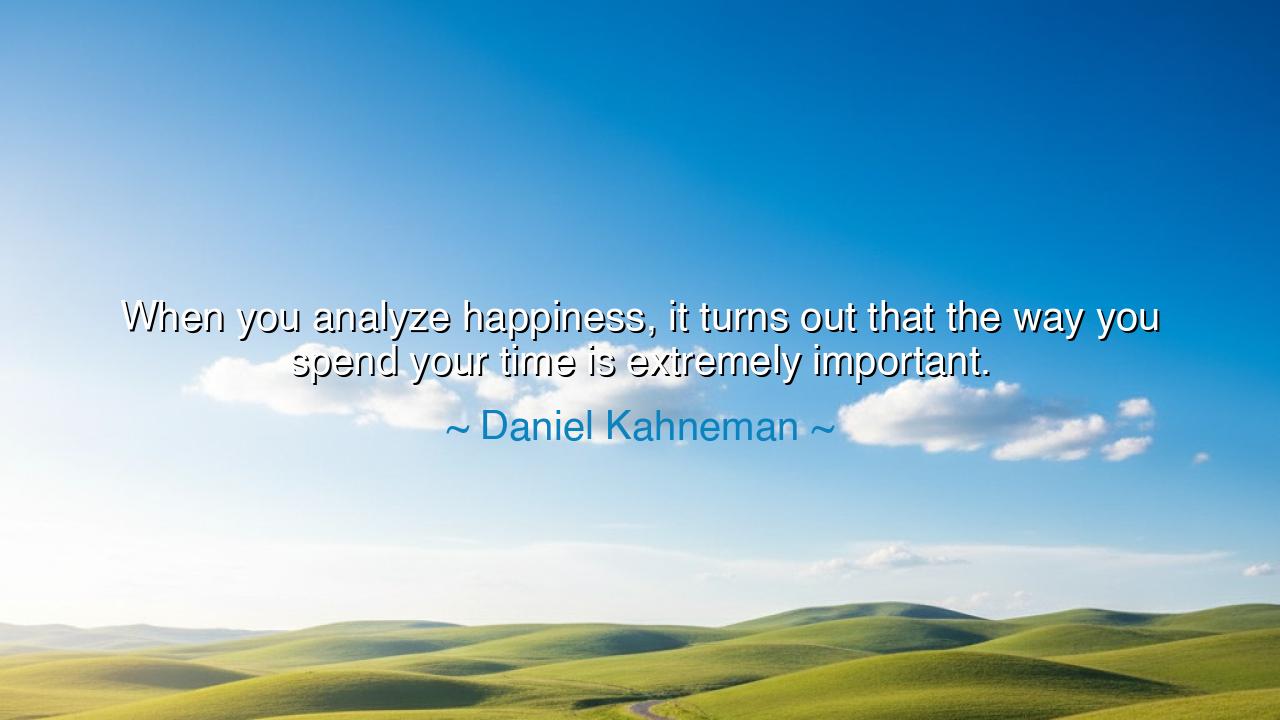
When you analyze happiness, it turns out that the way you spend
When you analyze happiness, it turns out that the way you spend your time is extremely important.






“When you analyze happiness, it turns out that the way you spend your time is extremely important.” Thus spoke Daniel Kahneman, the wise psychologist and Nobel laureate whose studies of the human mind unveiled the hidden patterns of thought and feeling that govern our lives. His words are not a mere reflection on productivity or leisure—they are a profound meditation on the essence of happiness, that elusive companion which so many seek yet so few truly understand. In this simple statement, Kahneman reveals a truth both ancient and eternal: that happiness is not an accident of fortune, nor a gift from fate, but the harvest of how one chooses to spend the hours of each day.
The origin of this insight lies in Kahneman’s lifelong inquiry into the nature of human experience. Through decades of research, he came to see that wealth, success, and status do not guarantee happiness. Instead, he discovered that time—how we shape it, how we fill it, and with whom we share it—forms the true architecture of joy. The way we live each hour constructs the quality of our days, and the quality of our days, in turn, becomes the story of our lives. His science affirmed what philosophers and poets have long known: that happiness is not found in great moments, but in the rhythm of our daily choices, the quiet constellations of time well spent.
The ancients, too, taught this sacred lesson. Aristotle spoke of eudaimonia, the flourishing life, which is not born from fleeting pleasure but from living purposefully in accordance with virtue. Seneca, the Stoic sage, warned that it is not that life is too short, but that we waste much of it. He wrote that time is the one possession we squander most recklessly, though it is the one thing we can never reclaim. Kahneman, though a man of modern science, whispers the same warning through the centuries: that how we use our time—what we give our hours and attention to—determines the depth of our happiness far more than what we own or achieve.
Consider the story of Leo Tolstoy, who, after fame and fortune, felt a great emptiness in his later years. Though the world celebrated him as a literary titan, his heart grew restless, for he realized that much of his time had been spent chasing acclaim rather than meaning. It was only when he began to devote his days to family, faith, and compassion for others that peace returned to his soul. His transformation stands as a living echo of Kahneman’s wisdom: that time spent in service, in love, and in presence yields a happiness that outlasts glory. The currency of joy is not gold, but moments given to what truly matters.
Kahneman’s insight also carries a deeper psychological truth—that attention is the soul’s most precious resource. Whatever we attend to, we feed with our life’s energy. If we spend our hours in distraction, complaint, or envy, our inner world becomes barren. But if we dedicate our time to creativity, friendship, gratitude, and growth, our spirits bloom like gardens in spring. Thus, the wise learn to guard their time as sacred ground, giving it only to that which nourishes the heart and expands the soul. For time, once lost, cannot be purchased again, and every wasted hour is a page torn from the book of one’s own becoming.
The lesson, then, is clear: to live well is to spend your time well. Examine each day not by what you have gained, but by how you have used the hours entrusted to you. Did you spend them in kindness, in learning, in love? Or did you let them drift away in aimless pursuit? Happiness is not found in the future, waiting for you to arrive—it is created in the present, shaped by the choices of each passing moment. The man or woman who masters their time becomes the craftsman of their own joy.
To live by this wisdom, one must cultivate intention. Begin each morning by asking: How shall I use this day so that it adds light to my soul and to others? Seek out the company of those who uplift you; dedicate yourself to work that gives life meaning; make time for stillness, for reflection, for gratitude. And when night falls, look back and ask not, “What did I achieve?” but “How did I live?” For every sunrise brings you a new canvas of time, and every act of attention paints upon it the portrait of your life.
So remember, dear listener: your time is your truest treasure, and your happiness its greatest return. Guard it, honor it, and fill it with what is worthy of your soul. For as Daniel Kahneman teaches, happiness is not hidden in distant dreams—it is found in the quiet alchemy of the present moment, in the way you spend your precious days. When your hours are aligned with your heart, your life itself becomes a masterpiece of meaning.






AAdministratorAdministrator
Welcome, honored guests. Please leave a comment, we will respond soon